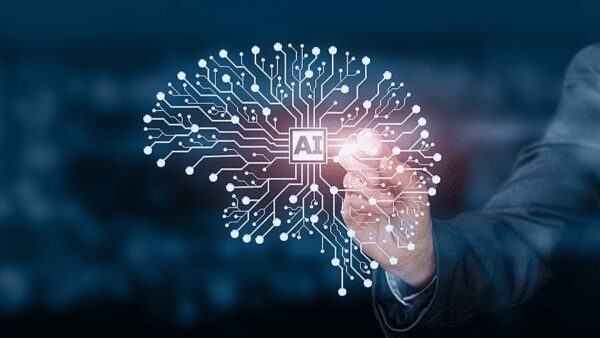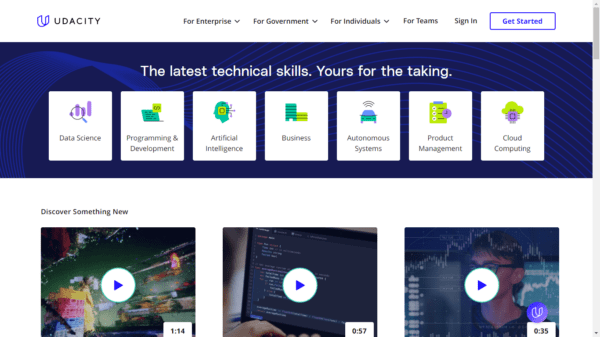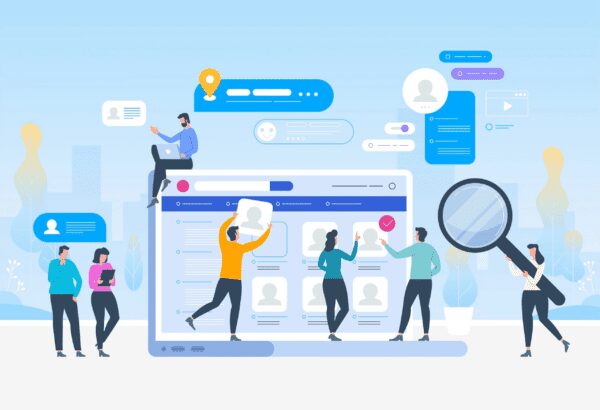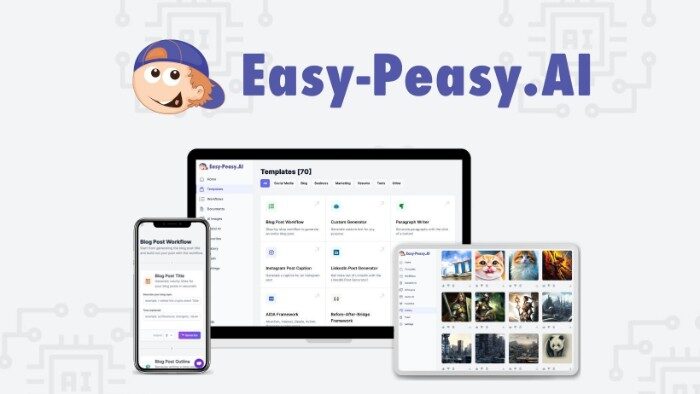Are you passionate about learning Artificial Intelligence (AI) concepts from scratch? Then you’ve come to the right place!
This complete guide will introduce you to the latest technologies and techniques, teaching you how to learn AI yourself easily.
From tools for building projects, a picture-perfect overview of computer vision systems, and skills development that is tailored to your individual needs – this post has it all covered.
So whether you’re taking your first steps into the world of machine or artificial intelligence or looking for in-depth help furthering your knowledge – let’s get started and explore together!
Table of Contents
- What is Artificial Intelligence?
- How to Learn AI Yourself: Step-by-Step Instructions
- Key Considerations for Successfully Learning Artificial Intelligence
- How to Learn AI Yourself: 7 Helpful Tips
- What are the Best Platforms for Learning AI?
- What are the Best Courses to Learn AI?
- Artificial Intelligence for Beginners – Udemy
- Introduction to Artificial Intelligence (AI) – edX
- Artificial Intelligence Specialization – Coursera
- Machine Learning A-Z Hands-On Python & R in Data Science – Udemy
- Deep Learning with TensorFlow 2 and Keras – Udemy
- Natural Language Processing Specialization – Coursera
- Reinforcement Learning Specialization – Coursera
- Deep Learning Specialization – Coursera
- Applied AI with DeepLearning – Udacity
- Where Can You Work as an AI Enthusiast?
- Wrapping Up
What is Artificial Intelligence?

Artificial Intelligence, commonly abbreviated as AI, refers to the science and engineering aimed at creating intelligent machines. These machines are designed to perform tasks that would typically require human intelligence.
The invention of various sophisticated algorithms, such as deep learning algorithms, deep neural networks, machine learning models, and data science techniques, has facilitated the advancement of AI technologies.
These algorithms allow machines to analyze and learn from data, enhancing their capacity to make decisions and carry out specific tasks. The applications of AI are vast, ranging from speech recognition and autonomous vehicles to healthcare and finance.
With the rapid development of AI, there is a growing need to ensure that ethical standards are in place to maintain the safety of humans and prevent the malicious use of AI-powered technologies.
Benefits of Learning Artificial Intelligence

The world of technology is constantly evolving, and Artificial Intelligence (AI) is at the forefront of the transformation.
Learning AI can provide a wide range of benefits, including the ability to handle Natural Language Processing (NLP) and data processing, which can improve businesses’ efficiency and efficacy.
Here are some of the benefits of learning artificial intelligence:
1. Increased Chance of Employment: With AI becoming increasingly prevalent in the workplace, knowledge, and experience in this field is highly sought-after by employers. Learning AI will give you a competitive edge in the job market and help you stand out from other potential applicants.
2. Improved Problem-Solving Skills: By learning new techniques for problem-solving, analyzing data, and creating algorithms, your problem-solving skills will be significantly improved. This valuable skill set is essential for any career that involves data analysis or programming.
3. Understanding Current Technologies: By understanding how AI works, you’ll be able to grasp better current AI technologies used in everyday life, such as virtual assistants and online search engines.
4. Awareness of Ethical Issues: AI-enabled technologies are often surrounded by ethical issues, from privacy concerns to algorithm bias. Learning about AI will help you stay informed on these topics and know how to address them appropriately when needed.
5. Career Advancement Opportunities: The demand for skilled professionals in artificial intelligence is growing exponentially every year. Learning AI can open up new career paths for you that weren’t available before or provide an edge over the competition if you already have experience in the field.
6. Financial Rewards: With more organizations looking to invest heavily into AI, individuals with knowledge and experience in this area stand to benefit greatly. Career progression in this field can also increase earning potential, making learning AI an excellent investment for the future.
How to Learn AI Yourself: Step-by-Step Instructions

Artificial intelligence (AI) has influenced the way we interact with technology. From virtual assistants to self-driving cars, AI is quickly transforming our world.
It’s no surprise that learning this cutting-edge technology has become increasingly popular. With the right resources and guidance, individuals can teach themselves AI and become experts in the field.
A great way to start this journey is, to begin with a solid understanding of deep learning models, AI and machine learning algorithms, and raw data.
Here’s a step-by-step guide on how to learn AI yourself:
1. Start With The Basics: Before diving into more advanced topics such as deep learning algorithms and neural networks, you should familiarize yourself with basic concepts such as probability and linear algebra fundamentals. Understanding these fundamentals is key to understanding AI technologies in more detail.
2. Get Hands-On Experience: Once you have developed a solid foundation in the basics of AI, the next step is to gain insights. Writing code and building basic AI projects can help you better understand how different algorithms work and familiarize yourself with the tools available for development.
3. Find Quality Resources: Make sure to use quality resources when learning
AI – plenty of free online tutorials and courses can get you started quickly and easily. Many universities also offer artificial intelligence certifications, which would benefit those looking to specialize in this field or pursue further education opportunities.
4. Stay Up-to-Date: Technology is ever-evolving, so it’s essential to stay up-to-date on recent developments in the field. Reading blogs, listening to podcasts, joining communities such as Reddit or Stack Overflow, and attending workshops can help you stay informed and motivated.
5. Stay Motivated: Learning AI is a long-term process that requires patience and dedication. Set realistic goals for yourself – don’t aim too high, or you may end up disappointed. Celebrate the progress you make along the way to keep yourself motivated!
By following these simple steps, you should be well on your way to mastering AI technologies and algorithms independently. So don’t get discouraged, and start learning today!
Key Considerations for Successfully Learning Artificial Intelligence

Artificial Intelligence (AI) has become an essential tool today, and many people are interested to learn AI from scratch. The key considerations for successfully learning AI include understanding AI algorithms, data structures and being able to solve real-world problems.
It is essential to first understand the fundamentals of AI before jumping into complex problems. Once you have a solid grasp of the basics, you can move on to understanding how AI algorithms work and applying them to real-life scenarios.
Here are other key considerations for learning the fundamentals of artificial intelligence:
1. Get Familiar With the Tools and Resources: AI involves a range of tools, technologies, and software packages that may not be familiar to you initially. It’s essential to gain familiarity with these tools before diving into more complex concepts.
2. Don’t Overlook Math and Statistics: A strong foundation in math is essential for understanding the underlying principles behind machine learning algorithms and deep learning networks. Make sure to brush up on your mathematical skills if needed.
3. Practice Makes Perfect: You can only understand and apply AI technologies if you practice them. So, once you’ve gathered the necessary resources and studied the foundational principles, it is time to get hands-on experience with coding and building projects.
4. Take Breaks: Learning can be overwhelming sometimes, so building breaks between study sessions is essential. Taking care of yourself while learning is essential – your mental health should always come first.
5. Ask Questions: Seek help from experts when needed – joining online forums such as Reddit or Stack Overflow can provide knowledge that would otherwise be unavailable. Asking questions will also help you gain insight into new concepts faster than figuring things out alone.
How to Learn AI Yourself: 7 Helpful Tips

Artificial intelligence (AI) is one of the most sought-after skills in the tech industry today, and learning it can be a game-changing decision for your career. But where do you even begin?
If you’re eager to jump into data structures, reinforcement learning, or other AI applications but don’t know where to start, fear not! There are several tips that you can follow to learn artificial intelligence yourself.
Here are 7 helpful tips for learning artificial intelligence yourself:
1. Take a Course: Taking an online course is one of the best ways to get up to speed quickly with AI technologies and algorithms. With so many courses available, you can find something that suits your needs.
2. Join Communities: Online communities such as Reddit or Stack Overflow can provide valuable insights into AI from experienced professionals. Not only will these help you understand complex topics better, but they also serve as great motivators!
3. Create Your Projects: Once you have gained knowledge on basic concepts of AI, create projects to put your knowledge into practice. Building AI applications and projects can help you gain hands-on experience and better understand the subject.
4. Use Quality Resources: With so many resources available today, it’s essential that you use quality resources when learning AI. Look for well-reviewed tutorials, courses, books, etc., so you don’t waste your time on irrelevant information.
5. Don’t Rush Through It: Learning AI requires patience – don’t rush through concepts, as this will only lead to confusion later on down the line. Take your time understanding each concept before moving on to the next one.
6. Stay Informed: Technology is ever-evolving, so it’s essential to stay up-to-date on recent developments in the field. Reading blogs, listening to podcasts, attending workshops, and staying informed can help you gain insights faster.
7. Stay Motivated: Learning AI is a long process – set realistic goals for yourself, and don’t give up! Celebrate your progress along the way to keep yourself motivated.
What are the Best Platforms for Learning AI?

There are many platforms available today for learning Artificial Intelligence (AI). Depending on your needs and preferences, some of the best platforms to learn AI include:
Udacity
Udacity offers a range of courses related to artificial intelligence, from beginner-level classes to more advanced topics such as reinforcement learning and natural language processing.
Coursera
Coursera provides both free and paid courses covering various aspects of AI. Their specializations are especially helpful if you’re looking for in-depth coverage of specific domains.
edX
edX also offers free online courses related to AI from top universities worldwide, with options ranging from basic concepts to more advanced applications.
Kaggie Learn
Kaggle is a great platform for practicing and learning AI. They provide datasets, competitions, tutorials, and more to help you learn AI from the ground up.
Udemy
Udemy has hundreds of AI and machine learning courses ranging from beginner to advanced. These are some of the best online learning platforms for Artificial Intelligence (AI). With patience, dedication, and determination, anyone can acquire the skills to create AI-powered projects.
What are the Best Courses to Learn AI?

The best courses to learn AI depend on your experience level and the type of AI application you want to develop.
For beginners, some great online courses include:
Artificial Intelligence for Beginners – Udemy
This course introduces the matching learning fundamental concepts and principles of AI. It covers the history of AI, machine learning algorithms, natural language processing, robotics, and more.
Introduction to Artificial Intelligence (AI) – edX
This course helps you understand how AI works and introduces the technologies used in modern AI applications. It also explores practical scenarios to help you better understand the field.
Artificial Intelligence Specialization – Coursera
This Coursera Specialization covers the fundamentals of AI, deep learning algorithms, natural language processing, and more. It also provides practical projects that help you apply your knowledge to real-world problems.
Machine Learning A-Z Hands-On Python & R in Data Science – Udemy
This course introduces machine learning and data science principles with hands-on experience. It covers essential topics such as supervised and unsupervised learning, decision trees, and linear regression.
Deep Learning with TensorFlow 2 and Keras – Udemy
This deep learning course covers the basics of TensorFlow and Keras and more advanced topics such as convolutional neural networks and recurrent neural networks. The course also provides a comprehensive overview of AI applications.
Note: If you already have a good understanding of the basics, then more advanced courses are available such as:
Natural Language Processing Specialization – Coursera
This course comprehensively overviews natural language processing (NLP) techniques. It covers state-of-the-art algorithms for text analysis, generation, and applications such as sentiment analysis and question answering.
Reinforcement Learning Specialization – Coursera
This specialization provides a comprehensive overview of reinforcement learning, emphasizing practical applications. It covers topics such as Markov decision processes and Monte Carlo methods.
Deep Learning Specialization – Coursera
This course provides an in-depth exploration of deep learning principles, covering topics such as convolutional neural networks (CNNs), recurrent neural networks (RNNs), and generative models. It also provides a comprehensive overview of AI applications.
Applied AI with DeepLearning – Udacity
Lastly, this course covers the fundamentals of AI and deep learning techniques. It introduces critical areas such as computer vision, natural language processing, and generative models.
These are some of the best courses for learning AI. With patience, dedication, and determination, anyone can acquire the skills to create AI-powered projects.
No matter your experience level, some excellent courses are available to help you learn AI and start your journey.
Where Can You Work as an AI Enthusiast?

Once you have acquired the skills and knowledge to create AI-powered projects, there are many opportunities for work as an AI enthusiast. Companies such as Google, Amazon, Microsoft, Apple, and many others hire AI professionals worldwide.
You can also find freelance jobs in this field or start your own AI business. There is no shortage of options for working in this field.
AI is used in almost every industry imaginable – from healthcare to finance to autonomous vehicles. As businesses continue to grow and expand their use of AI technology, the demand for qualified professionals will only increase.
One option is data engineering, which involves creating and maintaining large databases, analyzing data, and integrating new data sources.
Another route is becoming a machine learning engineer, designing and implementing machine learning models that enable AI systems to learn and improve their performance over time. AI research and development are always in demand for those interested in computer science.
Data analysis tools are also crucial for those in the industry, making it necessary to stay knowledgeable in software, data storage, and big data processing. The opportunities for AI enthusiasts are vast and exciting, with new industries and job titles emerging daily.
Wrapping Up
Learning AI from scratch can be intimidating, but with the right resources and strategies, anyone can master the fundamentals of this cutting-edge technology.
Work through AI courses to learn AI basics and then delve into more advanced concepts such as mathematics and computer science fundamentals to secure a solid foundation in the technical skills needed.
In addition, apply yourself with enthusiasm and dedication, form a regular study routine, engage with compatible peers, and get creative with real-world case studies to help you understand how AI works in practice.
With some hard work, you may soon be equipped to pursue new and exciting roles or projects made possible by artificial intelligence. And who knows? It could be you leading the way in a new area of machine learning and robotics shortly!





